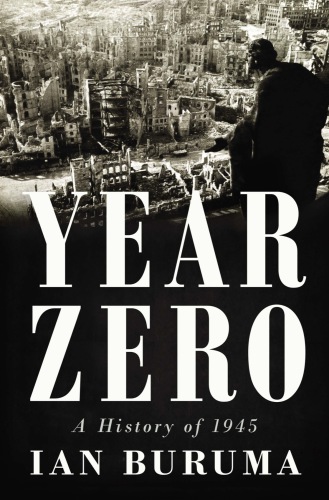
Year Zero
A History of 1945
کتاب های مرتبط
- اطلاعات
- نقد و بررسی
- دیدگاه کاربران
نقد و بررسی

Starred review from October 14, 2013
An account of the decisive first moment of the modern world, Buruma's (The China Lover, Occidentalism) history explores the nascent social and political forces that later influenced the Cold War and postâcolonial movements and ultimately defined the latter half of the 20th century. Starting with a world ruined by war, Buruma moves adeptly from describing the elation of victory and the desire for revenge to the Allies' attempts to reform societies by eliminating all traces of militarism or fascism and establishing a European welfare state, as destroyed cities are rebuilt and fallen nations reimagined. Despite the growing sense of optimism and confidence of the time, men and women still starved, justice was delayed and soldiers and refugees returned home to find themselves unwanted. Equally critical of the victors and the vanquished, Buruma takes great pains to document the brutality and cruelty committed around the world. Rooted in first-person accountsâmost notably, the author's own father, a Dutch student forced into labor by the NazisâBuruma's compelling book manages to be simultaneously global in its scope and utterly human in its concerns.

September 15, 2013
Insightful meditation on the world's emergence from the wreckage of World War II. Buruma (Democracy, Human Rights, and Journalism/Bard Coll.; Taming the Gods: Religion and Democracy on Three Continents, 2010, etc.) offers a vivid portrayal of the first steps toward normalcy in human affairs amid the ruins of Europe and Asia. The end of hostilities left landscapes of rubble and eerie silence and an economic collapse that gave rise to countless black markets. There was widespread hunger and misery. Millions were displaced, including Buruma's grandfather, who was seized by the Nazis, forced to work as a laborer in Berlin and finally reunited with his family after the war. Many of the displaced were afraid to go home, fearful that their homes were gone or that they would be regarded as strangers. Buruma re-creates the emotions of the time: the joy that lipstick brought to emaciated women in Bergen-Belsen; the wild abandon and eroticism of the liberation; and the desire for vengeance, sometimes officially encouraged, as in Russian road signs that said, "Soldier, you are in Germany. Take revenge on the Hitlerites." By the end of 1945, after years of danger and chaos, most people yearned for a more traditional order to life. They "hungered for the trappings of the New World, however crude, because the Old World had collapsed in such disgrace, not just physically, but culturally, intellectually, spiritually." Recounting the occupations of Germany and Japan and life in the Allied nations, Buruma finds that the war was a great leveler, eliminating inequalities in Great Britain and rooting out feudal customs and habits in Japan. Despite much longing for a new world under global government, postwar life was shaped not by moral ideals but by the politics of the Cold War. An authoritative, illuminating history/memoir.
COPYRIGHT(2013) Kirkus Reviews, ALL RIGHTS RESERVED.

September 15, 2013
In 1945, the war ended, but a new world began. Taken and destroyed cities were transformed; the liberated celebrated; scores were settled; people starved; justice was and was not meted out; soldiers and refugees came home; suffering ended, or continued, or began anew. An eclectic scholar who has written on religion, democracy, and war, Buruma presents a panoramic view of a global transformation and emphasizes common themes: exultation, hunger, revenge, homecoming, renewed confidence. Though there was great cause for pessimism, many of the institutions established in the immediate postwar periodthe United Nations, the modern European welfare state, the international criminal-justice systemreflected profound optimism that remains unmatched. Buruma's facility with Asian history lends this selection a particularly internationalized perspective. But it is the story of his fathera Dutch man who returned home in 1945 after being forced into factory labor by the Nazisthat sews the various pieces together and provides a moving personal touch.(Reprinted with permission of Booklist, copyright 2013, American Library Association.)

























دیدگاه کاربران